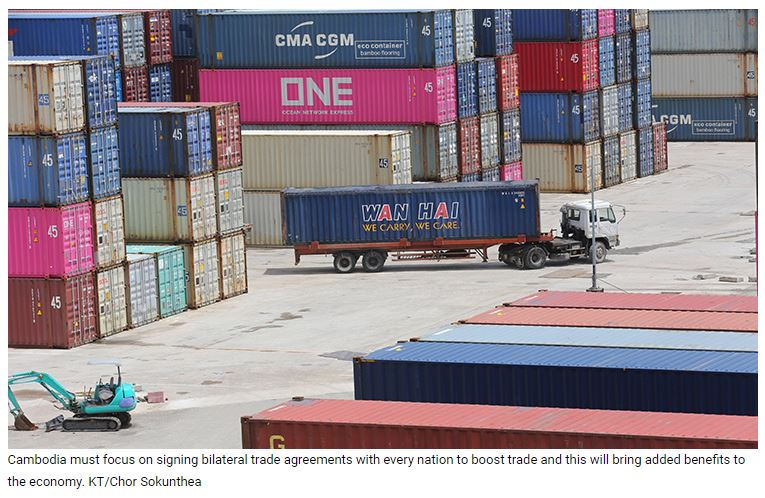RCEP a game-changer for Cambodia’s growth prospects
The Regional Economic Comprehensive Partnership (RECP) is all set to play a vital role in Cambodia’s journey towards economic prosperity, fuelling the nation to become a high middle-income country as early as 2028, opine experts.
Going by the World Bank definitions, low-income economies are those with GNI per capita of less than $1,025; lower-middle-income countries are those between $1,026 and $4,035, and upper-middle-income economies are in the range of $4,037 to $12,745. High-income countries are defined as those with a GNI per capita above that level.
RCEP, the world’s largest free trade bloc came into force January 1, 2022, comprising of 15 countries including the Asean states of Cambodia, Brunei, Indonesia, Laos, Malaysia, Myanmar, the Philippines, Singapore, Thailand and Vietnam along with China, Australia, Japan, New Zealand and South Korea.
Hong Kong has already started to implement the joining proceedings and is expected to join the RCEP soon. RCEP membership facilitates reductions and exemptions in tariffs, streamlined customs procedures, more enhanced supply chains and increased cross-border investments, among other benefits.
Speaking to Khmer Times, Vichet Lor, Vice-President of the Cambodia Chinese Commerce Association, said he believes that Cambodia can achieve the status of high middle-income country, two years earlier in 2028 than the government’s set target of 2030.
“One of the main reasons behind this reduction in the estimated time period is the proposed entry of Hong Kong into RCEP. Hong Kong is one of the freest, liberal, trade economies in the world. Hong Kong’s entry into RCEP will be a total game changer for Cambodia’s economic growth plans.”
Vichet pointed out that data and statistics bear testimony to the fact that the nation has had enormous economic benefits since the implementation of RCEP. “Even the rise in FDI, which hit a whopping $4.6 billion in 2022, could be, to a large extent, attributed to RCEP.
“It is a matter of fact that RCEP has enabled the flow of FDIs into Cambodia. Once Hong Kong becomes a member of RCEP, the next five years will witness a huge transformation of the Cambodian economic landscape encompassing our export markets, deep-sea port development, development of special economic zones as well as the tourism sector.”
He said, not only Cambodia, but all other 14 members will benefit from Hong Kong’s membership in the grouping. “In the coming five years (2023-2028), more countries are expected to join RCEP and every member will definitely have a positive impact on the Cambodian economy.”
He said the Cambodian economic outlook has been really positive. “The Asian Development Bank, earlier this year, predicted that the country will achieve 5.2 percent GDP growth. And now they have revised it to 5.8 percent. These revised estimates reflect the ongoing trends within the Cambodian economy. The National Bank of Cambodia predicts a six percent growth for the national economy.
“Except for the slight variations in growth figures, what we understand is that the Cambodian economy is quite vibrant and the joining of Hong Kong into the RCEP deal will further contribute as an economic stimulant for growth.”
With regard to India’s entry into RCEP, he said: “In the near future, India may consider an option to become a member of RCEP and it will again be a turning point. India has recently overtaken the United Kingdom and France to become the world’s fifth-largest economy.
“India is also better positioned than China when we take demographic quotients into consideration. RCEP already accounts for 30 percent of global trade and 32 percent of global FDIs. The entry of Hong Kong into the grouping, which is 99 percent confirmed and the joining of India into RCEP in the near future will be a global game changer.”
Vichet stressed that RCEP is already the world’s largest trading bloc and Cambodia’s membership in this grouping will help the country achieve its economic goals in the shortest time possible.
“With the admission of Hong Kong and India into the bloc, Cambodia will definitely become a high middle-income country by 2028 and this is very much possible, theoretically, mathematically, scientifically and figuratively.”
Economic analyst Tom Goh said RCEP membership will offer endless benefits to the Cambodian economy. “The joining of Hong Kong and India’s possible chances to join the bloc is all welcome news for Cambodia.
“However, Cambodia should definitely focus on signing bilateral trade agreements with every nation possible to boost trade and this will bring added benefits to the economy through various industrial sectors.”
He also highlighted that the nation should continue to attract FDIs consistently in the coming five years. “The coming years are very crucial for Cambodia and FDIs will definitely play an important role in the economic transformation of the nation. More FDIs in the export sector would boost Cambodia’s chances of benefitting from the RCEP membership as well as other trade agreements.”
When asked by Khmer Times, Sodeth Ly, Senior Economist, Macroeconomics, Trade and Investment Global Practice at the World Bank, said that there are high signs that Cambodia will return to seven percent growth in the coming years. “Tourism will be the major driver of the economy. The rise in tourism numbers will trickle down into other sectors, making the post-pandemic recovery intense.
“Cambodian economic growth will be bolstered by strong goods and services exports and a substantial increase in investments, especially under public-private partnerships for large infrastructure projects such as seaports and roads.
“Cambodia can aid this growth by investing in connectivity infrastructure and human development, safeguarding financial stability and promoting diversification of exports to enhance the economy’s resilience and competitiveness.”
The World Bank officially revised the status of Cambodia’s economy in 2016, moving it up one level from the low-income bracket into lower-middle income territory – a reclassification that economists expect will lead to a scale-back of foreign aid and preferential trade access over the coming years.
Source: https://www.khmertimeskh.com/501303664/rcep-a-game-changer-for-cambodias-growth-prospects/


 Thailand
Thailand




